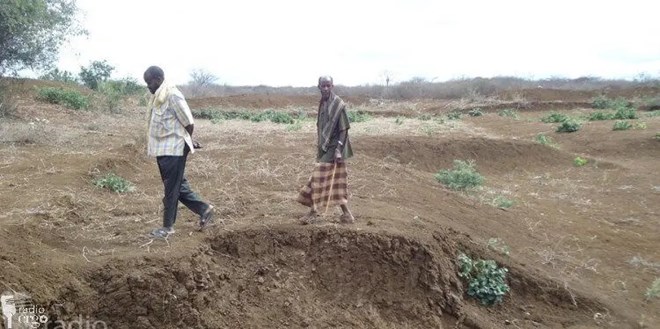Drought-ruined crops leave Sanag farmers in crisis

Thursday October 31, 2024

A famer surveys his failed crops in anguish /File Photo/Ergo
(ERGO) – Destroyed crops and an empty food store face Mohamed Said Dahir and his family of 12, after two years of failed rainy seasons struck their farm in Middigale, northern Somalia’s Sanag region.
He is among scores of farming families in Middigale, 60 kilometres east of Badhan, where agricultural outputs have been decimated by severe drought. Mohamed owns three farms and all of them are bare.
Mohamed said they rely on 15 kilos of food, including flour, rice, and sugar, which he took on credit from a local shop. They ration the food carefully, cooking only once a day.
Two years ago, before the drought, his farm was hit by flash floods that destroyed his crops. Before he could recover from that disaster, the drought came.
“The impact is severe. It’s affecting us in every aspect of our lives – food, education, and basic livelihood – and there is little we can do financially to change it,” Mohamed told Radio Ergo.
The prolonged drought has dried up two of the hand-dug wells he used for crop irrigation.
Mohamed noted that he invested $3,000 in his fields last September, planting crops such as millet, corn, beans, and various green vegetables. Everything failed and he is anxious about his mounting debt.
“The farm debts are overwhelming. I owe between $6,000 and $7,000, spent on well digging, machinery, irrigation pipes, and labour, yet the crops failed due to diseases,” Mohamed explained.
Five of his children are enrolled in a local school in Badhan, however he has been unable to pay the $150 school fees for the past three months. The school warned that his children risk expulsion unless he settles the fees.
Additionally, he is two months behind on rent, totaling $180 for his three-room home. He has pleaded with his landlord for more time, but they face eviction if he can’t pay by the end of October.
Mohamed was previously a pastoralist although severe drought in 2017 wiped out his 80 goats. He then transitioned to farming to support his family, selling his house and piece of land in Middigale to raise $8,000, which he used to purchase and develop farmland as an alternative livelihood
Hundreds of families in this area, once reliant on agriculture, now face food scarcity due to poor harvests. Some have even abandoned farming after repeated losses and debt accumulation.
Abdirahman Mohamed Farah, another farmer, shares a similar plight. His family of 10 now cook once daily using food they get from their relatives. He lost hope in his farm when irrigation became impossible.
Abdirahman, who had turned six years ago to farming, says he has no other skills to support his family.
“We were herders and farming was unfamiliar to us. We lacked training, and without irrigation, many of our crops, like tomatoes, onions, and green vegetables have withered away,” he said.
On his 1.5 hectares, Abdirahman was growing crops twice yearly, making $500 to $1,000 per harvest. However, he is now earning $2-3.5 a day as a porter when he can get work.
Since August, he has been unable to pay his children’s school fees, with the arrears amounting to $95.
“We are getting tired, and our morale has deteriorated. We used to support each other but we are now overwhelmed, with no means of sustenance or finances. I’ve hired labourers multiple times to dig my well, borrowing money from people, but the debt remains unpaid,” he told Radio Ergo.
Abdirahman is the sole breadwinner and says he has never before encountered such a severe crisis.
The deputy governor of Middigale, Ibrahim Ahmed Duale, said they were fully aware of the difficulties and losses faced by the farmers. He emphasised that the area was an important bread basket in this region of northern Somalia and that urgent solutions were needed.
“There were around 150 farms in this area, employing and supporting about 500 people, including displaced persons and former herders. Whether it was planting or harvesting, they got their livelihoods from the farm. Now, both the farm owners and workers are overwhelmed by the drought, as the situation is beyond challenging,” he said.
Ibrahim reported that they had relayed the farmers’ situation to Puntland’s ministry of agriculture, as the severity of the crisis exceeded local capacities. Despite multiple appeals, no response had yet been received from the authorities.
